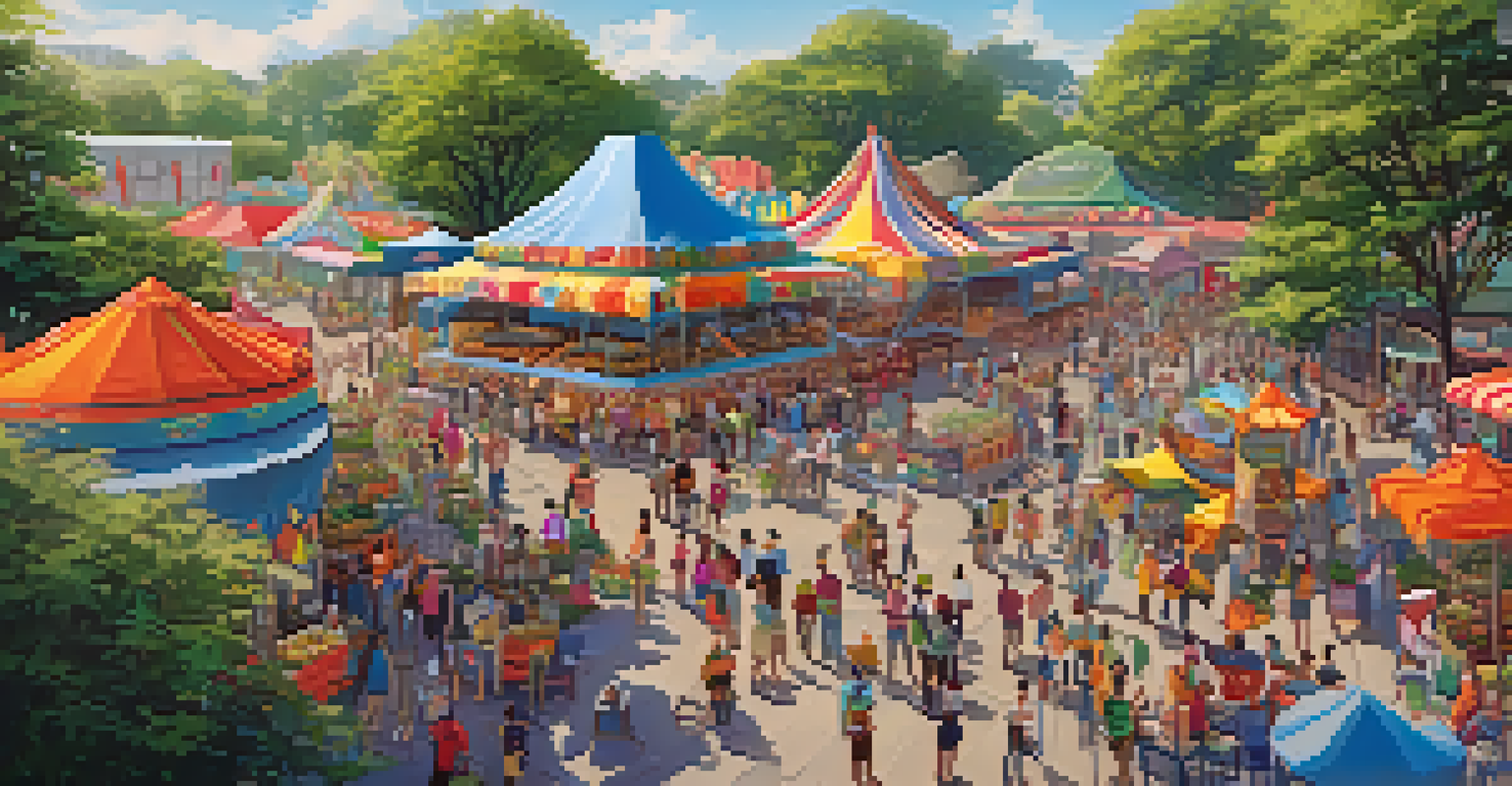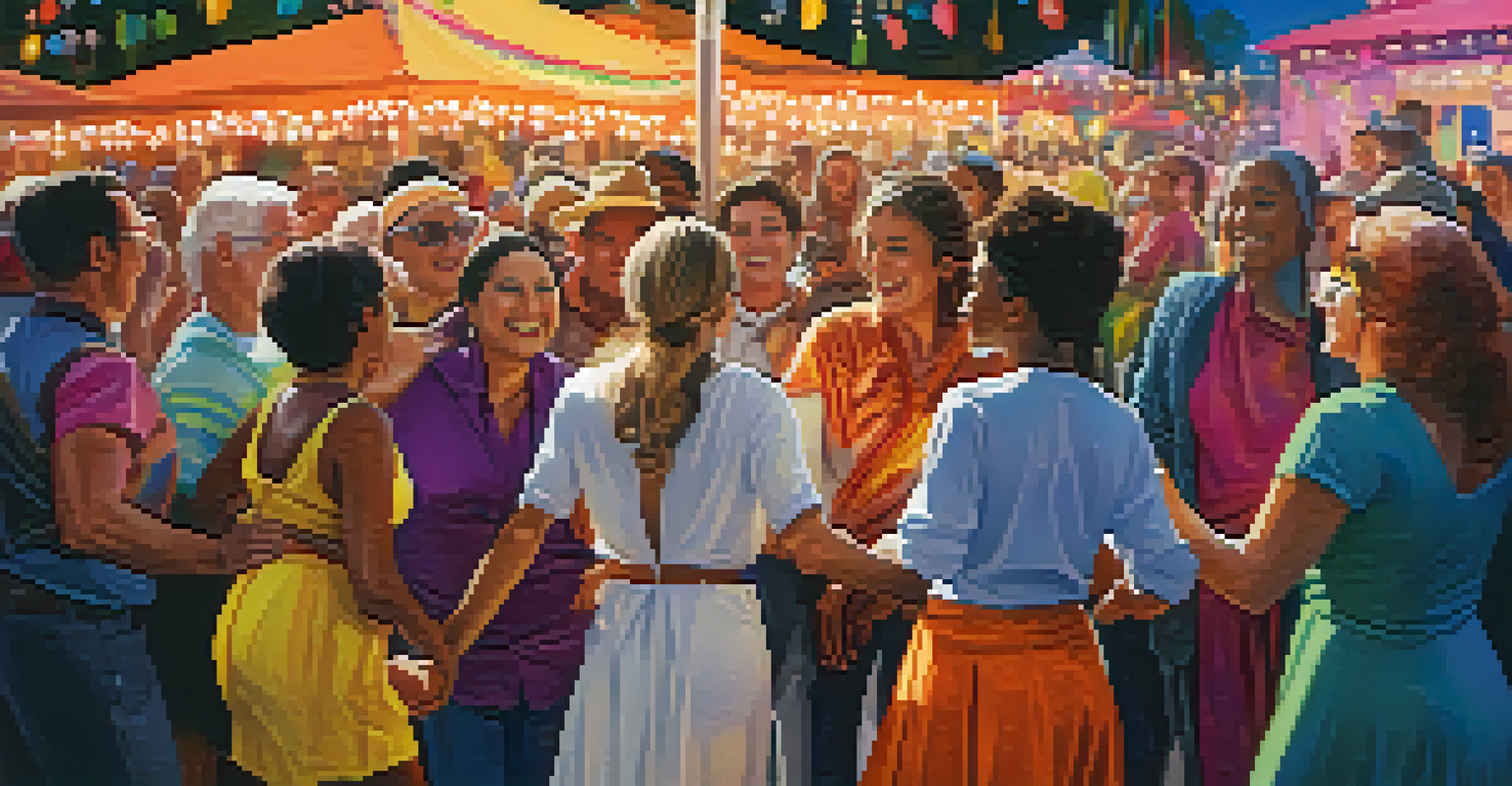How to Organize a Community Music Festival Successfully

Define Your Purpose and Goals for the Festival
Before you dive into planning, it's crucial to define the purpose of your festival. Are you aiming to celebrate local talent, raise funds for a cause, or simply bring the community together? This clarity will guide your decisions throughout the planning process.
A festival is not just an event; it's a celebration of community, creativity, and connection.
Set specific, measurable goals that align with your festival's purpose. For instance, you might aim to attract a certain number of attendees or raise a specific amount of funds. These goals will not only motivate your team but also provide benchmarks for success.
Remember, having a clear purpose and goals creates a roadmap for your festival. It helps keep everyone on the same page and ensures that all efforts contribute to a common vision.
Assemble a Dedicated Planning Team
Organizing a music festival is no small feat, so it’s essential to gather a team of passionate individuals who share your vision. Look for people with varied skills, such as marketing, logistics, and community outreach, to cover all bases.

Assign clear roles and responsibilities to each team member. This structure ensures that tasks are managed effectively and everyone knows what they’re accountable for. Regular check-ins can help maintain momentum and keep the team engaged.
Define Purpose and Set Goals
Establishing a clear purpose and measurable goals provides direction and benchmarks for your festival planning.
A dedicated team not only lightens the workload but also brings diverse perspectives to the table. This collaboration can spark innovative ideas, making your festival unique and memorable.
Secure a Suitable Venue for Your Festival
Choosing the right venue is a critical step in ensuring your festival’s success. Consider factors like location, capacity, and amenities, as these will impact accessibility and comfort for attendees. A park or outdoor space might be perfect for a casual vibe, while an indoor venue could offer more control over weather conditions.
The best way to predict the future is to create it.
Once you have a shortlist of potential venues, visit them in person. This allows you to visualize the layout and identify any logistical challenges, like parking or power sources for the performances. It’s also a chance to gauge the overall atmosphere.
Don’t forget to review the venue contract carefully. Check for any restrictions on sound levels, alcohol sales, or other regulations that could impact your plans. Being diligent here saves headaches down the line.
Book Talented Musicians and Performers
The heart of any music festival is its lineup, so take time to curate a diverse range of talented musicians and performers. Consider featuring local artists to foster community spirit, as well as a mix of genres to appeal to a broader audience.
Reach out to artists well in advance to ensure availability. Create a clear communication plan that outlines expectations, performance times, and compensation. This transparency builds trust and sets a positive tone for the festival.
Assemble a Passionate Team
Creating a diverse and dedicated planning team fosters collaboration and innovative ideas essential for a successful festival.
Lastly, think about including not just music, but also other forms of entertainment, like dance troupes or spoken word artists. This variety keeps the festival dynamic and engaging for attendees.
Plan Logistics: Permits, Equipment, and Safety
Logistics might not be the most glamorous part of festival planning, but it’s essential for a smooth event. Start by researching the necessary permits and licenses required by your municipality to avoid any legal hiccups.
Next, consider the equipment you’ll need, such as sound systems, stages, and lighting. Collaborate with rental companies to ensure you get quality gear that matches your festival's scale and vibe.
Lastly, prioritize safety by developing a comprehensive plan. This includes crowd control measures, first aid stations, and emergency protocols. A well-organized festival not only ensures a good time but also keeps everyone safe.
Promote Your Festival to Attract Attendees
Effective promotion is key to drawing in crowds for your music festival. Utilize social media platforms to create buzz and engage with your audience. Share behind-the-scenes content, artist spotlights, and sneak peeks to build excitement leading up to the event.
Consider using a mix of traditional marketing methods as well, such as flyers, posters, and local radio ads. Partnering with local businesses can also amplify your reach and create a sense of community support.
Engage Community for Inclusivity
Involving the community in the planning process and prioritizing inclusivity enhances the festival experience and strengthens local ties.
Don’t forget to encourage word-of-mouth promotion. Incentives like early bird ticket discounts or referral rewards can motivate attendees to spread the word, increasing your festival's visibility organically.
Engage the Community and Foster Inclusivity
A successful community music festival thrives on local engagement. Involve community members in the planning process, whether through surveys or volunteer opportunities. Their input can lead to better ideas and a festival that truly reflects the community’s spirit.
Make inclusivity a priority by ensuring that your festival is accessible to everyone. This includes considering wheelchair access, providing diverse food options, and creating a welcoming atmosphere for all ages and backgrounds.

By fostering a sense of belonging and inclusivity, you not only enhance the festival experience but also strengthen community ties. A festival that feels like home will resonate more deeply with attendees.
Evaluate and Celebrate Your Festival's Success
After the festival wraps up, take time to evaluate its success against your initial goals. Gather feedback from attendees, volunteers, and performers to identify what worked well and what could be improved for future events.
Celebrate the achievements of your team and the community. Acknowledging everyone's hard work boosts morale and fosters a positive environment for future collaborations. Consider hosting a small gathering or sending out thank-you notes to express your gratitude.
Lastly, document your experiences and lessons learned. This reflection not only helps with planning future festivals but also contributes to a growing knowledge base within your community. Your festival can become a cherished tradition with the right adjustments and continual improvement.